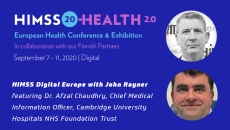Workforce
Intelligence sharing and collaborative best practices can help with risk mitigation as pandemic-era cyberattacks increase, says Parham Eftekhari, executive director of the Cybersecurity Collaborative.
Irene Froehlich, chief communications officer at DrFirst, discusses the changing world of digital health and offers advice on starting a career in health tech.
A KLAS report finds that most health systems rely on a mishmash of artificial intelligence and machine learning tools to meet their needs.
Healthcare lawyer Andrew Selesnick said one key will be to establish a stable, user-friendly platform that can make documentation seamless.
Dr. Daniel J. Nigrin, senior vice president and CIO at Boston Children’s Hospital, will take over in January.
The Federally Qualified Health Center didn’t let COVID-19 stand in the way of a successful EHR implementation. Here’s a step-by-step look at how they did it.
Data from a real-time location system, covering nearly 4.3 million square feet, offers the ability to see patients and staff who may have come into proximity with an infected person.
The workforce is embracing technology to improve patient outcomes in areas such as barcode medicine and sepsis, says Dr. Afzal Chaudhry, CMIO at Cambridge University Hospitals NHS Foundations Trust in the UK.
Although "technology can be a great equalizer," it can also be used to further inequities, said panelists at HLTH VRTL 2020.
Oliver Wyman's chair of diversity and inclusion talks about why gender parity is still struggling despite companies' best intentions.


